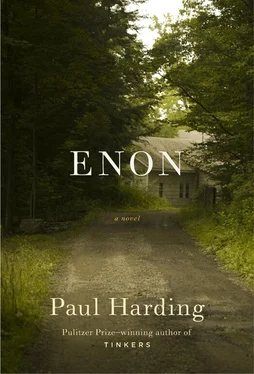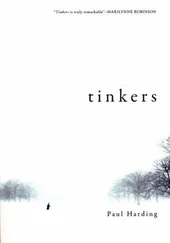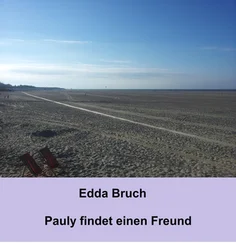I rolled the end of the rod against my nose in the dark garage bay and fitted the rod together. I held the rod at arm’s length and flicked it up and down a couple times. I laid the rod across the top of an old dresser and found my grandfather’s favorite reel in the tackle box. It was still fitted with a fly line and leader. I tightened the reel into the reel seat at the base of the rod and balanced the rod and reel in my open hand. A grainy, chalky light came into the garage from the back window, and I could just see the overgrown yard, beneath a chest-high layer of mist. The mist hanging over the yard looked like the mist we often found hovering over the pond we fished in Maine in the morning. The mist in the yard seemed aqueous and the high grass just beneath it like weeds in an outlet. The grass in the yard had clumped and braided and was all brushed in the same direction, as if it were being combed through by currents. No doubt wind had made the patterns, but with the mist billowing over it in the near dark, the yard seemed like a phantom body of water.
I drew the line leader through the eyelets along the length of the rod, the reel clicking out its length. I pulled the line through the tip of the rod and yanked a couple more yards of line off the reel and set the rod back on the top of the dresser. My skin felt tacky and I suddenly felt as if I were contracting inside my skin, or as if my skin were dilating, I couldn’t really tell which, in a way that I have felt many times near dawn, after having been up all night, when the adrenaline of nocturnal wakefulness suddenly burns off, and whatever energy it is that holds your muscles to your bones and your skin to your muscles evaporates and you suddenly feel as if all your tissues and organs are made from soft lead, and you falter under the sudden burden of exhaustion. Whatever combination of drugs and alcohol had sustained my late-night foraging disintegrated. The cool grainy, plastery smell of the garage suddenly felt like sleeping gas, a perfume no longer tonic but now sedative. I had a sudden urgent need to get back into the house and onto the couch, under a single, cool quilt, and feast on sleep. But, oddly, along with the necessity of sleep, there came the succinct, imperative thought — which the instant before had not existed and in the next permeated my entire mind, to such an extent that it seemed as if my brain had never been made for anything other than to contain it, and which I experienced not as a thought but as a newly acquired but no less deep-seated instinct — that before I could sleep I had to wade out into the early dawn mist and weeds in the backyard and cast. Just as suddenly as I had been transformed into a new species living in a new world, the implications of that new world began to elaborate themselves, and my first thought as an angler of rivers of grass was that, whatever fly I chose for fishing the yard, I had to clip off its barbed hook, so that it would not snag in the fibers of the grass-water. I selected a yellow grasshopper from a tin of flies and snipped off the hook. I tied the fly to the end of the leader and stepped out the back door of the garage into the mist and the snarled flow of long grass. I waded out into the yard and stepped up onto the old oak stump in the middle, slightly above the fog. Reflexively, I let go the fly on the end of the line and began to flick the rod back and forth over my head and yank arm lengths of line out from the reel, pausing a bit longer between each back-and-forward cast to allow the longer and longer lengths of line to uncoil behind me and roll out in front of me properly, so that when I finally laid the line out the fly would plink onto the surface of the water with no more disturbance than an actual bug. I threw the first cast toward the tree line at the end of the yard, near a tree that had fallen out of the woods and just into the yard. The line rolled out and dropped the fly down into the mist, just to the right of the tree. I meant to lure any fish that might be hovering among the tree’s submerged branches. Because I was casting into a meadow, for wicker fish, I had to jerk and haul at the line to retrieve the fly. I realized that I was using the same sort of fly that I had when I’d taught Kate how to fish, and that I had clipped the hook off that fly, as well, so that neither of us would get hooked on the ear or the back of the head, should Kate have trouble with the pace and timing of her casts.
After five casts at the same spot near the tree without a strike, I turned forty-five degrees to my right and presented the fly out to what looked in the gloom like it might be a clump of locust saplings. I listened for rising fish and by habit focused on where I knew the fly rested under the surface of the fog, waiting for the sudden grab of a fish at the bait. Light rimmed up against the horizon behind me and sparkled inside the dark mist. As I beat at the fog-submerged yard and the line sizzled above my head, and, when I mistimed a cast, the fly snapped like the frayed end of a whip, and I turned a few degrees at a time on the stump, presenting the fly along the circumference of the yard, and the light slowly rose up into the world, and I could see the large, dark roots of the trunk radiating out from below in every direction, it seemed for a moment that I was standing on the hub of a great spoked wheel suspended in a cloud and spinning at breathtaking speed and that the force of my centrifugal casts and centripetal retrievals acting on its axis might just create some kind of torsion where, for a fraction of an instant, I might find myself standing next to my daughter in a wooden rowboat at dawn.
Instead, the light increased, the mist shimmered and rain-bowed and began to lift away. The lawn appeared, neglected and literal. Exhaustion overtook me again, this time along with the humiliation of being high and drunk, fly-fishing off a tree stump in my backyard. I began to crank the line back onto the reel and the fly snagged in a hump of weeds. I pulled the rod and it bent into a U, but the line would not break. I checked my pockets, but I had nothing with which to cut the line. The first heat of the day coated my skin, and sweat began to run out of my hair, along my jaw, down my nose, along the nape of my neck. My eyes and my head ached. I dropped the rod and reel where I stood and hurried back through the garage, across the driveway, and into the silent, arrested darkness of the house, where I rummaged through a plastic food container full of prescription bottles, found some sleeping pills, popped four of them, curled up on the dusty couch, among the old newspapers and books and bottles and ashtrays, and tried to keep thoughts about Kate away from myself in my decrepit state, holed up in what, as I passed out, struck me as the kind of nest in which a rat would live.
KATE HAD A PART-TIME job as a tennis instructor at the Enon playground the summer she died. She had taken lessons at the playground for six years and become an excellent player. She was co-captain of her middle school team and certainly would have made the high school varsity squad her first year. I knew Sylvia Black, the woman who ran the summer program at the playground, from my grandfather, so I talked to her and she agreed to let Kate teach some lessons, even though she was only thirteen. I never mentioned it to Kate because it would have embarrassed her. Anyway, she was thrilled to have a real job. She took it very seriously and sometimes was a little too intense with the kids, I thought. The first lessons she gave were at eight in the morning, and she biked to the playground by seven-thirty every day. The playground was located behind the Enon Tea House, where mostly women went every day for tea and cucumber sandwiches. The tennis courts were located below the playground, down among a stand of trees, near a vernal swamp the fire department flooded every winter for skating.
Читать дальше












